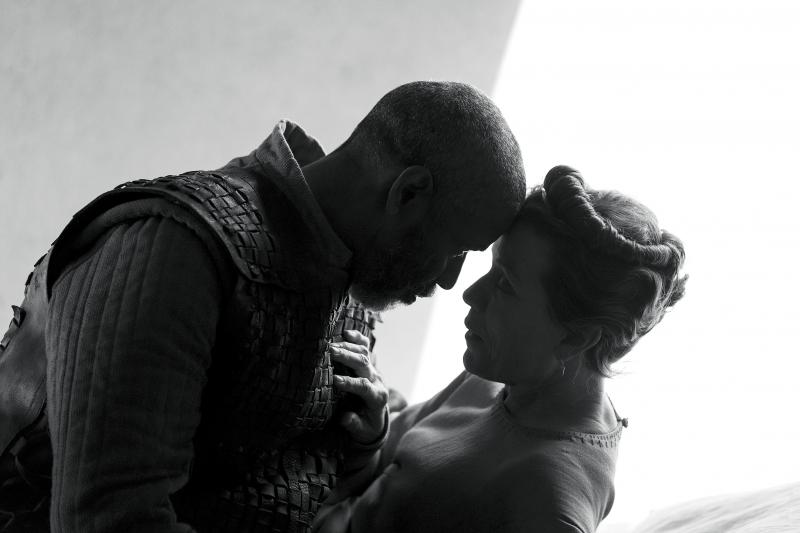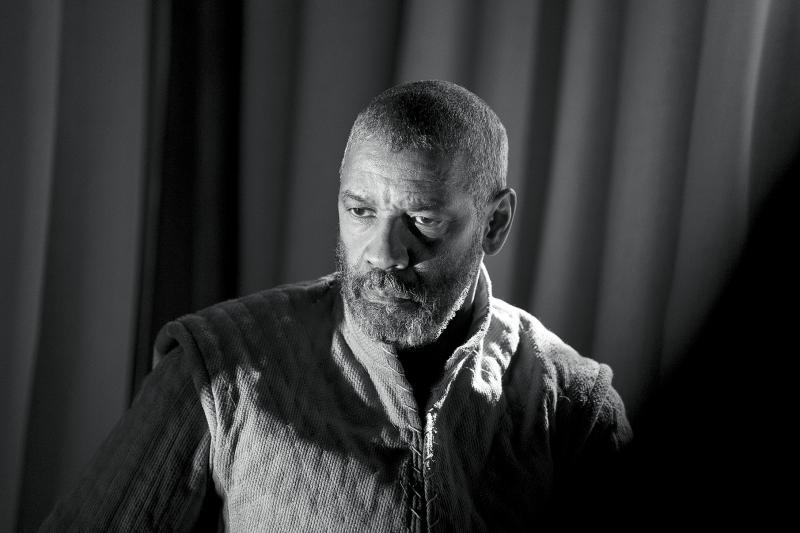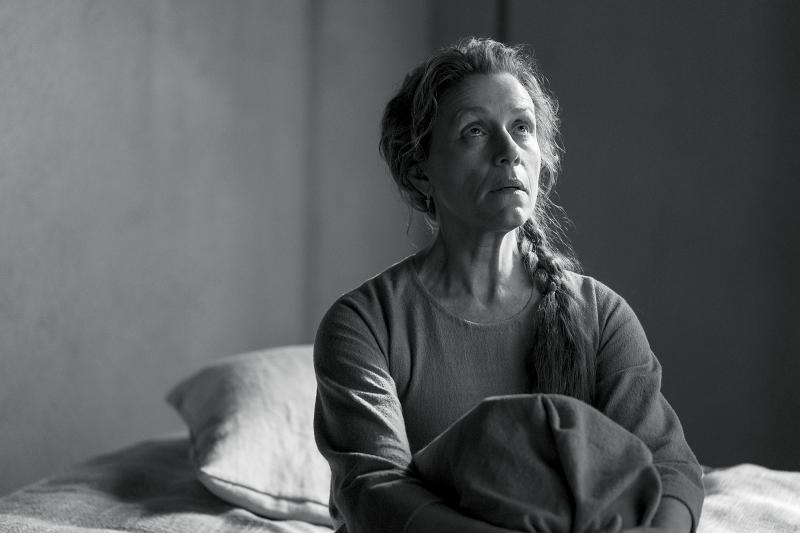His hair is graying. His nerves are fraying. Denzel Washington’s Macbeth is a man quite literally running out of time, even before he meets those witches.
At 66, Washington is certainly at the older end of the spectrum of conceivable Macbeths. But it makes wonderful sense: In Joel Coen’s brilliantly imagined, brilliantly executed The Tragedy of Macbeth, we confront a man who knows in his bones — his aching bones — that the witches’ prophecy has given him his last chance to be what wants, no, deserves! King of Scotland.
For an actor of Washington’s unique skill set, not to mention facility with Shakespearean verse, Macbeth at any age would be right, frankly. But there’s something wonderful about the fact that it took this long, with all the experience and seasoning Washington now brings to bear. Still, this isn’t simply a matter of an actor meeting a role at the right time.

Photo: AP
No matter how cursed or unlucky the so-called “Scottish play” is in theater lore, the stars seem to be aligned here. First, the movie stars: As Lady Macbeth, Frances McDormand is a perfect partner to Washington in age (64) and every other way, adding her signature clear-eyed urgency — and a few legendarily icy stares — to an often caricatured role. And boy, do these two look right together. Maybe it’s true, as somebody said, that the Macbeths have the only good marriage in Shakespeare — though the bar is not high. (Those teenagers Romeo and Juliet had a very short one.)
Completing the dream trio is director Coen (McDormand’s husband, in his first solo outing without brother Ethan), creating an austere and chilling yet gorgeous and stylish cinematic universe. It’s a world in black and white and gray, full of fog, shadows and mist — a chiaroscuro vision that seems half real, half fantasy.
Designer Stefan Dechant’s set, built onto sound stages, is populated by Brutalist-type structures, high walls, long corridors and tall staircases and dirt paths outside. The key sensation is emptiness: There seems barely a prop around except for swords, doing their vicious work. It feels vaguely medieval but unconnected to a specific period — and thankfully not 2021, either. Most strikingly, Coen and superb cinematographer Bruno Delbonnel present a film literally wrapped in a box, in what they call an academy-ratio square frame.

Photo: AP
As befits the bard’s briefest tragedy (albeit with a long list of murders most foul), Coen’s film clocks in well under two hours. We begin, as we should, with the three witches, and the ominous “fair is foul, and foul is fair” line — meaning all is not what it seems, an understatement of Shakespearean proportions. In a terrific creative decision, Coen gives us only one actor, the wonderful veteran Kathryn Hunter, as a shape-shifting contortionist who morphs at will into three identical figures.
Despite a few judicious cuts, the language is preserved and the story is, of course, the same: After the witches prophesize that Macbeth will become king, he decides, propelled by the tough-love urgings of his wife (“When you durst do it, THEN you were a man”) to hasten the process by murdering much-loved King Duncan (Brendan Gleeson, excellent).
Washington’s Macbeth, who often speaks in a soft voice — even a whisper — is racked with indecision beforehand. But what if we fail, he asks. “We fail?” his wife replies, but in McDormand’s reading, it’s essentially, “Look at us, what the heck do we have to lose?” (Don’t answer that, folks.)

Photo: AP
And so the bloody cycle begins. This Macbeth is, as always, about politics, power, and the corrosive effects of ambition. It is not, however, about sociopaths. It feels more about mediocrity — and the desperation that brings — than monstrosity.
There’s much acting talent here beyond the leads. Corey Hawkins, a standout in pretty much anything he does, is a dashing presence as noble Macduff, who has the distinction of killing Macbeth (this swordfight doesn’t disappoint) once he apprises him that he was “untimely ripped” from his mother’s womb — very bad news if you’re Macbeth. As Macduff’s doomed wife, Moses Ingram makes much of her one scene.
Washington, who’s played Shakespeare onstage numerous times (and onscreen in 1993) recently said that it’s “where I started, and where I want to finish.” As a student at Fordham University, he played Othello, a role he prepared for by listening to recordings of Laurence Olivier in the library.
When he speaks of finishing, one hopes he isn’t referring to anytime soon. After all, King Lear awaits — right, Mr. Washington?
But as for his Macbeth, it’s McDormand who perhaps said it best when asked recently about casting the role. “You don’t make lists for a generation’s Macbeth,” she said. “One is born, and then they play it.” Sounds about right.

On April 26, The Lancet published a letter from two doctors at Taichung-based China Medical University Hospital (CMUH) warning that “Taiwan’s Health Care System is on the Brink of Collapse.” The authors said that “Years of policy inaction and mismanagement of resources have led to the National Health Insurance system operating under unsustainable conditions.” The pushback was immediate. Errors in the paper were quickly identified and publicized, to discredit the authors (the hospital apologized). CNA reported that CMUH said the letter described Taiwan in 2021 as having 62 nurses per 10,000 people, when the correct number was 78 nurses per 10,000

As we live longer, our risk of cognitive impairment is increasing. How can we delay the onset of symptoms? Do we have to give up every indulgence or can small changes make a difference? We asked neurologists for tips on how to keep our brains healthy for life. TAKE CARE OF YOUR HEALTH “All of the sensible things that apply to bodily health apply to brain health,” says Suzanne O’Sullivan, a consultant in neurology at the National Hospital for Neurology and Neurosurgery in London, and the author of The Age of Diagnosis. “When you’re 20, you can get away with absolute

May 5 to May 11 What started out as friction between Taiwanese students at Taichung First High School and a Japanese head cook escalated dramatically over the first two weeks of May 1927. It began on April 30 when the cook’s wife knew that lotus starch used in that night’s dinner had rat feces in it, but failed to inform staff until the meal was already prepared. The students believed that her silence was intentional, and filed a complaint. The school’s Japanese administrators sided with the cook’s family, dismissing the students as troublemakers and clamping down on their freedoms — with

As Donald Trump’s executive order in March led to the shuttering of Voice of America (VOA) — the global broadcaster whose roots date back to the fight against Nazi propaganda — he quickly attracted support from figures not used to aligning themselves with any US administration. Trump had ordered the US Agency for Global Media, the federal agency that funds VOA and other groups promoting independent journalism overseas, to be “eliminated to the maximum extent consistent with applicable law.” The decision suddenly halted programming in 49 languages to more than 425 million people. In Moscow, Margarita Simonyan, the hardline editor-in-chief of the